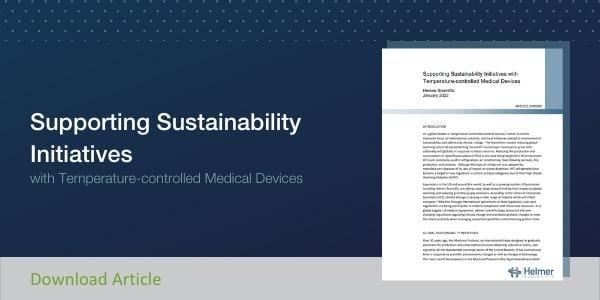The World Health Organization (WHO) identifies climate change as the single biggest health threat facing humanity.
Climate change already affects health in multiple ways, including illness and death, from extreme weather events that are occurring more frequently; disruption to food systems; increases in water-, food-, and vector-borne diseases; and mental health issues.
Because of climate change, healthcare organizations are faced with an increasing numbers of patients who require treatment. This raises the amount and cost of care health systems must provide.
At the same time, there is increasing recognition that healthcare facilities themselves contribute to the climate crisis with significant levels of carbon emissions. The health care sector is responsible for 8.5 percent of all greenhouse gas emissions in the United States.
Clinical laboratories use temperature-controlled storage to maintain the integrity of specimens, reagents, and blood products. The type of refrigeration systems in use are a contributing factor to a health system’s overall carbon footprint. The hydrofluorocarbon (HFC) refrigerants used in conventional cold storage units have higher global warming potential (GWP) than alternative coolants.
Regulatory Developments
At this time, 25 states and Washington, D.C. have adopted greenhouse gas emissions targets to help address global warming. Timelines and specific reduction targets vary by state.
HFC refrigerants are a major contributor to global warming. In 2021, the federal government passed the American Innovation and Manufacturing (AIM) act to address the use of HFCs. The AIM act directs the EPA to phase down production and consumption of HFCs by 85 percent during the next 15 years.
The EPA Significant New Alternatives Policy (SNAP) program provides guidance on prohibited high-GWP HFC refrigerants in Rules 20 and 21. Currently, 24 states have either enacted, or plan to enact, legislation aligned with these SNAP program rules.
Some of this legislation, for example CA SB1206, includes prohibitions on the importation and use of non-reclaimed refrigerants during equipment service in certain settings.
Facilities in California, Colorado, Connecticut, Delaware, Hawaii, Maine, Maryland, Massachusetts, New Jersey, New Mexico, New York, Oregon, Pennsylvania, Rhode Island, Vermont, Virginia, and Washington should review existing and proposed legislation to ensure they have the most up-to-date information when choosing compliant cold storage equipment.
How to support sustainability in your lab
In healthcare settings, making decisions that reduce an organization’s overall carbon footprint without sacrificing performance requirements is a positive step that supports sustainability.
Selecting laboratory cold storage that uses energy efficient technology and low GWP refrigerants will help reduce a facility’s environmental impact.
For example, R134a is a refrigerant commonly used in medical-grade refrigerators. R134a is a high GWP refrigerant with a 100-year GWP of 1,430.
An alternative to R134a is R600a, a natural hydrocarbon refrigerant used in advanced medical-grade refrigeration technology. R600a is classified as a low GWP refrigerant with a 100-year GWP of 3. The GWP impact of R600a is 99.8 percent less than R134a.
Helmer Scientific provides professional medical-grade equipment that supports sustainability and meets the strict performance requirements of the clinical lab.
GX Solutions Laboratory Refrigerators and Freezers utilize OptiCool™ Technology, which combines a variable capacity compressor with natural hydrocarbon refrigerants. This technology ensures cold storage devices deliver optimal temperature performance, reduce noise output, and efficiently manage energy consumption.
OTHER BLOGS YOU MAY BE INTERESTED IN...
- Survey: Clinical Labs Expanding Use of Medical-Grade Refrigeration
- Staffing Challenges Emphasize Need for Reliable Cold Storage Equipment
- Pass-Thru Refrigerators Support Efficient Lab and Blood Bank Workflows
- Protecting Laboratory Media from Temperature Excursions
Our article on supporting sustainability initiatives with temperature-controlled devices provides more information on regulatory efforts to target climate change in the United States and globally.
It also describes Helmer Scientific’s proactive approach to managing our product portfolio, which supports our customers’ efforts to comply with regulations and reduce environmental impact.





